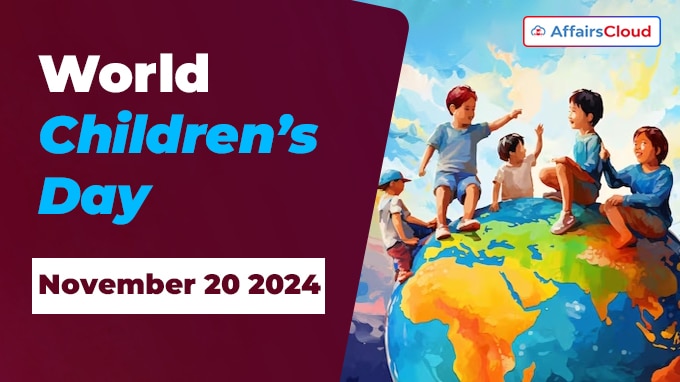 The United Nations (UN)’s World Children’s Day is annually observed across the globe on 20th November to promote international togetherness, awareness among children worldwide, and improving children’s welfare.
The United Nations (UN)’s World Children’s Day is annually observed across the globe on 20th November to promote international togetherness, awareness among children worldwide, and improving children’s welfare.
- This is an annual day of action for children by children led by the United Nations Children’s Fund (UNICEF).
Theme:
The theme of World Children’s Day 2024 is “Listen to the Future!”.
- The 2024 theme highlights the need for intergenerational dialogue, encouraging children to share their visions for the future and urging the adults to listen and incorporate these perspectives into the decisions which will shape the world for the next generation.
Background:
i.World Children’s Day was initially established as the Universal Children’s Day.
ii.On 14th December 1954, the United Nations General Assembly (UNGA) adopted the resolution A/RES/836(IX) and recommended all the nations to institute a Universal Children’s Day with effect from 1956.
Why November 20?
Since 1990, the date 20th November marks the anniversary of the adoption of the Declaration of the Rights of the Child (1959) and Convention on the Rights of the Child (1989) by the UNGA.
State of the World’s Children Report 2024:
i.The “State of the World’s Children 2024: The Future of Childhood in a Changing World” examines the forces and trends shaping our world today and reflects on how they might shape the future.
ii.The report explores 3 megatrends: demographics shifts, the climate and environmental crises and frontier technologies, which impact’s children’s lives between 2024 and 2050.
iii.The report also offers three future scenarios for how children could experience the world of 2050.
Points to note:
i.The report projects significant population changes, with Sub-Saharan Africa and South Asia hosting the largest child populations by the 2050s.
ii.The report also highlighted that the digital gap remains distinct. In 2024 over 95% of people in high-income countries have internet access compared to 26% in low-income countries.
Key Facts:
i.Currently, only 15% of children aged 3 attend early education programmes, the lowest rate in the Europe and Central Asia region.
ii.Moreover, a concerning 1 in 7 mothers of children aged 1–14 report that physical punishment is a necessary tool for raising children.
iii. A recent study also revealed that only 1 in 4 children in street situations have access to education, underscoring the urgent need for comprehensive social support and educational resources.
About United Nations Children’s Fund (UNICEF):
UNICEF was established in 1946 as the United Nations International Children’s Emergency Fund (UNICEF). It became a permanent part of the UN in 1953 and its name was shortened to the United Nations Children’s Fund.
Executive Director(ED)– Catherine M. Russell
Headquarters– New York, the United States of America (USA)




